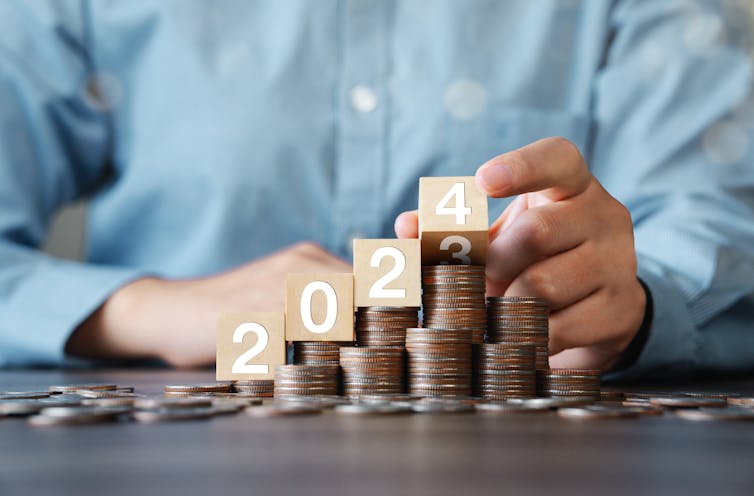 Image Source: With , The Conversation turned to two financial economists to share their thoughts on the upcoming year. and are professors who study . They explain what they’re watching in 2024.
Image Source: With , The Conversation turned to two financial economists to share their thoughts on the upcoming year. and are professors who study . They explain what they’re watching in 2024.
1. At this time last year, many experts saw a downturn on the horizon. Will that long-predicted recession finally come to pass in 2024?
The good news is, probably not.The U.S. economy is and will likely . Over the past year, , and . , as has . Additionally, and financial markets are at . While no one should argue that there will never be another recession, – unless there’s some unexpected , a new global pandemic.To be fair, optimism leads to risk-taking, . And the U.S. economy faces plenty of challenges, including , , rising and , which could result in . Other headwinds include , and and .While 2023 has seemed to many people like a “” – that elusive achievement in which policymakers reduce inflation – have followed periods . That may be why bankers, and economists are .Still, and , . Plus, despite dysfunction in Washington, recent laws and policies like the , the , the and the could further by creation and enhancing competitiveness. Notably, public and private manufacturing and industrial investment are at , and technology is , further contributing to the , not to mention .
2. Then what about a ‘vibecession’? Are we in one now, and why does it matter for 2024?
When you look at the economic pessimism and on , a fascinating paradox emerges – despite the collective bad vibes, the majority of .The : While the economy continues to grow, . The fact that consumer spending , despite the , underscores a curious split between sentiment and economic activity.
3. What if individual income and spending keep rising? Wouldn’t that be enough to end the vibecession?
In short: Not necessarily.While – . As a result, that . Is reminiscing like prior generations killing the vibes? If inflation rises faster than wages in 2024, the vibes may suffer.What’s more, have seemed to barely affect the vibes. Just about , which is a crucial factor in maintaining consumer confidence and spending habits.To be sure, gas prices also play an , and as they unexpectedly fell in December, . This highlights the impact of on the public’s mood and suggests that can quickly influence overall economic sentiment.However, we suspect that – spending money – until some shock forces them out of it. This between perceived gloom and personal financial well-being and material realities that shapes the overall economic narrative.
4. Could the vibecession become a self-fulfilling prophecy?
Consumers say they feel bad, but they’re , which . These facts seem at odds with each other, and some experts could . This is because when they’re the future.However, this has been the case for months – so it’s unclear why it should change now. , we think it makes more sense to focus on what people do, not what they say. And people are behaving in a way that’s , not to mention a .And overall, if you of that , you shouldn’t be shocked that . If , it should surprise no one when for a .
5. What else are you watching for in 2024?
, more than they anticipated before Chair Jerome Powell gave an optimistic press conference. Though , meeting responses were strong, deeming inflation defeated and consensus .While investors – again – and economic growth is likely as the economy continues to normalize post-pandemic. The most likely outcome for 2024 is that the Federal Open Market Committee until rates end the year just below the . However, for inflation to reach its 2% target before lowering rates, which means that rapidly falling inflation could make more rate cuts possible., albeit at a more muted rate. And with , housing starts and mortgage originations . Now, may , albeit from the worst level in decades.While to involve , hopefully economic conversations will happen in . And if we are lucky, , though we should remember that almost everyone was wrong last year – and if there’s one prediction we can make with confidence, it’s that will .![]() , Associate Professor of Finance, and , Associate Professor of Finance and the David A. Thompson Distinguished Scholar of Applied Investments,
, Associate Professor of Finance, and , Associate Professor of Finance and the David A. Thompson Distinguished Scholar of Applied Investments,
More By This Author:
Economic Lookahead: As We Ring In 2024, Can The US Economy Continue To Avoid A Recession?

